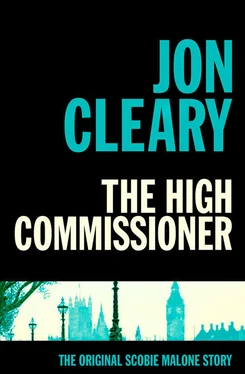Jon Cleary - The High Commissioner
Здесь есть возможность читать онлайн «Jon Cleary - The High Commissioner» — ознакомительный отрывок электронной книги совершенно бесплатно, а после прочтения отрывка купить полную версию. В некоторых случаях можно слушать аудио, скачать через торрент в формате fb2 и присутствует краткое содержание. Жанр: unrecognised, на английском языке. Описание произведения, (предисловие) а так же отзывы посетителей доступны на портале библиотеки ЛибКат.
- Название:The High Commissioner
- Автор:
- Жанр:
- Год:неизвестен
- ISBN:нет данных
- Рейтинг книги:3 / 5. Голосов: 1
-
Избранное:Добавить в избранное
- Отзывы:
-
Ваша оценка:
- 60
- 1
- 2
- 3
- 4
- 5
The High Commissioner: краткое содержание, описание и аннотация
Предлагаем к чтению аннотацию, описание, краткое содержание или предисловие (зависит от того, что написал сам автор книги «The High Commissioner»). Если вы не нашли необходимую информацию о книге — напишите в комментариях, мы постараемся отыскать её.
The High Commissioner — читать онлайн ознакомительный отрывок
Ниже представлен текст книги, разбитый по страницам. Система сохранения места последней прочитанной страницы, позволяет с удобством читать онлайн бесплатно книгу «The High Commissioner», без необходимости каждый раз заново искать на чём Вы остановились. Поставьте закладку, и сможете в любой момент перейти на страницу, на которой закончили чтение.
Интервал:
Закладка:
Riding in the taxi towards Belgravia Malone tried to rehearse what he would say to Quentin; and after a while gave up. How did you face a man, secure in a new life and a new identity, almost impregnable behind the importance of his office, with a crime that was distant in time and place, ten thousand miles and twenty-three years from here and now? “Your Excellency, in regard to an ancient murder . . .” Malone gazed out of the window of the taxi, trying to make his mind a blank, trusting that the right words would come by instinct when the moment arrived. Habit, sometimes, was a comfort.
The taxi pulled in before the big four-storied house. Malone got out and conditioned by another habit paid the driver the exact amount on the meter.
“You Aussies,” said the driver, an economist from Bethnal Green. “I bet you don’t have any balance of payments deficit.”
Malone, who had never tipped a taxi-driver in his life, looked at the man blankly. “Belt up,” said the latter, and drove off, gnashing his gears instead of his teeth.
Malone shrugged, beginning to appreciate why someone had once written that the English were incomprehensible, and turned towards the house. He was surprised at its size; he was a long way from the five-roomed house in Erskineville where he had grown up. Then he looked at the other houses in the square and saw that some of them were even bigger; this square was a manifestation of living that he had only read about. This was diplomatic territory; above almost every entrance there jutted a white flagpole, like a single blunt-tipped mammoth’s tusk; the huge front doors had the magnificent discouragement of a butler’s façade. The heavily elegant cliff-faces of the houses hid secrets that exercised the British Government; but none of them held such a secret as this house behind him. He turned, hesitated, then pressed the bell firmly.
II
The door was opened by a butler, something Malone had never experienced in his life before. He had all the appearance of the butlers Malone had seen in films: tall, portly, his aristocratic nose pushed back by a smell not apparent to men with less sensitive olfactory organs. But when he spoke his rich purple voice had a foreign tinge to it, and at once Malone thought he had come to the wrong address.
“Is this the home of the Australian High Commissioner?”
“It is, sir. May we ask whom you wish to see?” Monarchs and butlers, Malone thought: who else has the right to speak in the royal plural?
“The High Commissioner. My name is Malone and I have a special message for him from the Premier of New South Wales.”
The butler looked suspiciously at him, then he stood aside, opening the door wider. Malone stepped into an entrance hall and waited while the butler, like a bishop on his way to the altar, did a slow march towards the rear of the house. Though the hall was only sparsely furnished, Malone was at once aware that he was on the close outskirts of luxury. Through a half-open door he caught a glimpse of a room that reminded him of illustrations he had seen in Vogue , a periodical that had once been delivered by mistake to the Murder Squad and reduced the officers there to a state of depressed inferiority. He turned his head and saw himself in a huge gilt-framed mirror: he looked at the stranger there who seemed so out of place. He shifted his feet nervously in the thick carpet of the hall, feeling as awkward as a three-legged colt. Suddenly he wanted this business of Quentin over and done with quickly. He would come back in his old age and look at London.
The butler came back down the hall with a girl. He stood aside, watchful as an old sea-lion; images kept flashing through Malone’s mind, but he could not see the butler as just a man like himself. The girl came forward.
“I am the High Commissioner’s secretary.” She, too, had a slight accent. Stone the bloody crows, Malone thought, whatever happened to the Australian accent? “What was it you wanted?”
“I have a personal message from the Premier of New South Wales.” He had no such thing; but he had not expected it to be so difficult to get in to see Quentin.
“A letter?”
“No, it’s verbal.”
“I’m sorry, but the High Commissioner is busy. Could you not come to Australia House tomorrow?”
Malone shook his head, trying not to appear too stubborn. He liked the look of the girl: tall, good-looking, blonde, and with a poise about her that he had looked for in the girls he had known and had so rarely found. But he sensed her impatience with him and he was aware of the cold disapproving eye of the butler. “The message is urgent and important.”
The girl looked at the butler, and Malone read the message that passed between them. They think I’m some crank! He was appalled at the idea, remembering his own impatience as a policeman with cranks. His hand moved towards his pocket to take out his identification badge. Then his hand dropped back to his side and he smiled to himself at the situation and his own reaction to it.
“Perhaps if you told the High Commissioner that the message concerns Tumbarumba, he might see me.”
“Tumbarumba?” The girl was now convinced she was dealing with a crank.
“It’s a town, not a disease.” This comes of employing foreigners, Malone thought; and began to feel more xenophobic by the minute. He had always been tolerant of the foreign migrants who had come to Australia, even those he had had to arrest; but now these two foreigners, the girl and the butler, were beginning to annoy him with their attitude towards him. Deep inside him he knew that regardless of their accents, they were only doing their job of trying to protect the High Commissioner from uninvited and unwanted guests. But they were also trying to prevent him from doing his job, one that he wanted finished as soon as possible. He was out of his depth here, in alien territory no matter that his country’s ambassador lived here, and he wanted to be on the plane at once for Sydney, home and an atmosphere where he didn’t have to be so secretive. He said sharply, “Just tell the High Commissioner that I’ve come from Tumbarumba.”
The girl raised an eyebrow, as if recognising for the first time that Malone was accustomed to some authority. Without a word, but with a nod of warning to the butler, she turned and went back along the hall. Malone and the butler stood watching each other in the huge mirror: they were posed in the gilt frame like a tableau titled Suspicion . Then the girl came back.
“This way, Mr.—”
“Malone.”
“Mr. Malone. The High Commissioner will see you.” Her poise had been cracked a little; there was no mistaking the surprise she felt that the ambassador had agreed to see this crank.
She led Malone down the hall, pushed open a door and stood aside. “Mr. Malone, sir, from Tumbarumba.”
“We are not to be disturbed, Lisa,” said the man standing in front of the marble-fronted fireplace. “By anyone .”
The girl closed the door. Malone, feeling more awkward than he had ever felt in his life before, stood watching the man across the room from him. He had checked on newspaper photographs of Quentin; but they had not done the man justice. He was taller than Malone had expected, and slimmer. His thick wavy hair, brushed close to his head, and his military moustache were grey, but somehow they did not add age to his lean high-cheeked face; Malone would have guessed him to be at least five to six years younger than the age that showed against him in the file. The wide sensitive mouth looked as if it knew the exercises of humour, and the dark blue eyes looked as if they, too, could smile with enjoyment. But not now: eyes and mouth were both stiff with suspicion.
“What is it, Mr. Malone?” Quentin’s voice, Malone guessed, would normally have been deep and pleasant. Now it was strained, a little high: the Australian accent was evident, the vowels flattened. “My secretary said you were from Tumbarumba.”
Читать дальшеИнтервал:
Закладка:
Похожие книги на «The High Commissioner»
Представляем Вашему вниманию похожие книги на «The High Commissioner» списком для выбора. Мы отобрали схожую по названию и смыслу литературу в надежде предоставить читателям больше вариантов отыскать новые, интересные, ещё непрочитанные произведения.
Обсуждение, отзывы о книге «The High Commissioner» и просто собственные мнения читателей. Оставьте ваши комментарии, напишите, что Вы думаете о произведении, его смысле или главных героях. Укажите что конкретно понравилось, а что нет, и почему Вы так считаете.












